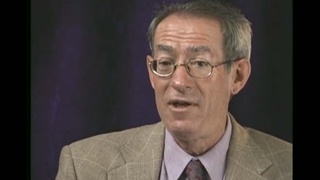Interviews
Political motivation to keep the camps open until end of 1944 election
I knew that there was a very strong political reason for keeping the camps open beyond November of ‘44, which was the presidential election. I put my head together with Donna Komure, who was the young lawyer on the Commission [staff] and we both decided to hand over to Mr. Brooke a few of the documents that specifically said, “Don’t close the camps until after the election is over,” meaning we might lose votes on the West Coast if we do that [close the camps]; that the anti-Japanese group will be so angry at us. And we were able to give to Mr. Brooke two or three documents from different high-level people—the attorney general, the Chief of Staff [General] George C. Marshall, and McCloy himself—that [these papers] confirmed that there was this other reason for not closing the camps; and it was totally political [advantage].
They wanted to wait [to announce camp closings] until Mr. Roosevelt was re-elected. Then, of course, in December [1944], they announced the closing of the camps [after the president was successfully re-elected to his fourth term and after the Supreme Court ruled in favor of Endo]. Mr. Brooke was very happy to have actual proof, directly from the Archives, to show that there was this political motivation to keep the camps open until such time [after the presidential election].
Date: August 26, 1998
Location: Virginia, US
Interviewer: Darcie Iki, Mitchell Maki
Contributed by: Watase Media Arts Center, Japanese American National Museum
Explore More Videos

Not recognizing father after reunion at Crystal City, Texas
(1937 - 2021) Teacher

A child's memories of activities at Crystal City, Texas
(1937 - 2021) Teacher

Hearing about Pearl Harbor
(b. 1921) Nisei veteran who served in the occupation of Japan


“Work hard at the job you’re at”
(b. 1931) U.S. Former Secretary of Transportation


Traveling to Manzanar
(b. 1921) Nisei veteran who served in the occupation of Japan

Findings of the commission report
(b. 1931) U.S. Former Secretary of Transportation

Victory Corps Work during World War II
(1925 - 2018) Nisei educator from Hawai‘i

Jobs in Manzanar
(b. 1921) Nisei veteran who served in the occupation of Japan

Speaker pro tem on the day the bill went to the House
(b. 1931) U.S. Former Secretary of Transportation

Citizen participation
(b. 1931) U.S. Former Secretary of Transportation

Signing of the bill
(b. 1931) U.S. Former Secretary of Transportation

Sugar beet and potato farming in Idaho
(b. 1921) Nisei veteran who served in the occupation of Japan

“No racial profiling”
(b. 1931) U.S. Former Secretary of Transportation
